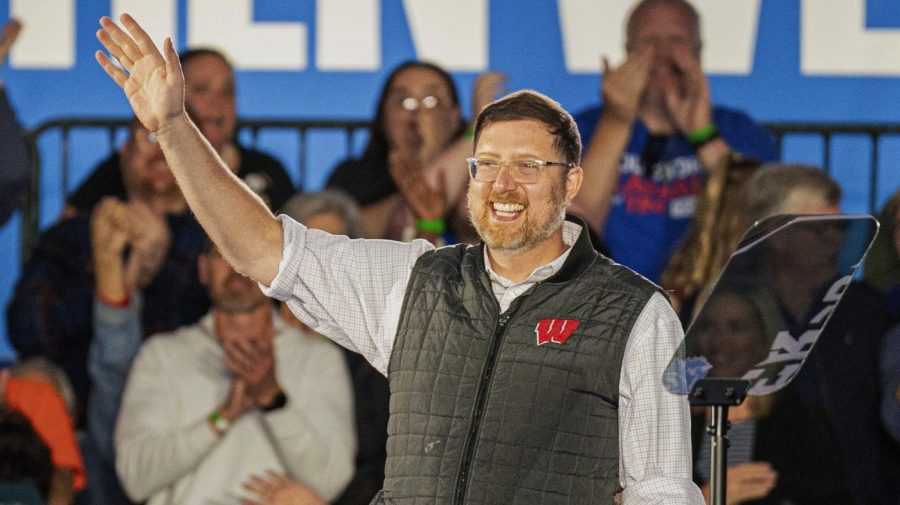]
Texas is facing a tumultuous 2025, as simmering feuds within the state’s ruling coalition are poised to boil over during its coming legislative session.
The power struggle within the Texas GOP comes alongside a wave of new challenges for the state, from a burgeoning water crisis to the condition of its electrical grid — all of which are set to play out amid President-elect Trump’s return to the White House in 2025, which could represent a double-edged sword for his allies in Austin.
From the battle for control of the state GOP to whether marijuana will stay legal in Texas, here are four big questions to watch in the new year.
Who will win the state GOP power struggle?
The highly charged race between incumbent Sen. Ted Cruz (R) and challenger Rep. Colin Allred (D) drew the focus of national observers this election cycle, but an even more dramatic fight has been taking place within Texas’s ruling Republican coalition.
Over the last year, that battle saw state executive officials such as Gov. Greg Abbott, Lt. Gov. Dan Patrick and Attorney General Ken Paxton attempt to purge the Texas House of Republicans who had defied them.
Their target: control of the Legislature’s lower chamber, a body that — while still dominated by conservatives — has stood as a bastion of relative bipartisan collegiality and independence as the state party has become increasingly dominated by so-called MAGA Republicans allied with Trump and his supporters.
The officials’ effort was overwhelmingly successful in replacing incumbent House candidates who had fought Abbott’s push for school vouchers or voted to impeach Paxton. And in December, after candidates chosen by state party leaders largely claimed victory in the November elections, Abbott and his allies clinched their biggest win yet when Texas House Speaker Dade Phelan (R) — who just barely survived a bruising primary runoff for his East Texas seat — announced he would not be seeking reelection to the chamber’s top spot.
But Phelan’s withdrawal hasn’t meant the end of the civil war. Abbott, Patrick and Paxton’s involvement in the business of the House — and the fact that they spent heavily to dislodge members who had largely been loyal to them — left a lot of bitter feelings in its wake.
Now the Texas GOP is split between two factions, each of which has declared victory in the Speaker’s race and a different way forward for the party. State Rep. David Cook (R) — Phelan’s primary challenger, who is backed by the hard-right “reformer” wing of the GOP — wants to end the practice of giving committee chair positions to Democrats and pass sweeping vouchers.
Meanwhile, state Rep. Dustin Burrows (R), a former Phelan lieutenant, wants a more measured approach to vouchers, and to keep the House’s current bipartisan character. Burrows claims that, with Democratic support, he has enough votes to be Speaker — while the state GOP has threatened any members who support him with being effectively stripped of party identification and support.
Whoever wins, the race is likely to leave the Legislature steeped in bad blood — just as Texas must confront a wave of serious emerging problems.
What happens when the White House stops fighting Texas on immigration?
Texas’s GOP leadership spent the Biden administration in a state of open opposition to the federal government and Democratic-run localities on immigration, with state leaders like Abbott railing against White House asylum policy, challenging the administration for control of the state’s border with Mexico and busing migrants to Northeastern cities.
Those efforts have garnered national attention for the Texas governor and helped drive national concerns around immigration. But their impact in terms of policy appears to have been limited, as the Biden administration has pursued its own approach to immigration and opposed many of Abbott’s moves.
The rise of Abbott ally Trump to the White House signals a significant shift in federal immigration policy — and, potentially, what Texas will be able to do on the issue. Texas officials have offered access to more than 13 million acres of state land for internment camps to the incoming Trump administration, which ran on a platform of mass deportations. The state is also fighting in court to conduct its own deportations — which, if successful, would effectively make it the first state to establish its own immigration policy.
The prospect of such deportations has spurred fear not just among undocumented Texans, but also among business owners who rely on them — particularly in fields like construction, though also in agriculture and oil and gas. Undocumented workers put an estimated net of more than $11 billion into the state economy, according to one 2016 analysis.
Those concerns have led some state Republicans to call for caution, according to The Texas Tribune. In November, Rep. Tony Gonzales (R) warned that mass deportations were bad policy coupled with bad politics. “If the message is, ‘We’re here to deport your abuelita,’ that’s not going to work well,” Gonzales said on ABC News. “It has to be one of holding these hardened criminals accountable.”
But Gonzales is something of a maverick in the state Republican party, which has censured him for voting with Democrats. He is opposed in this perspective by fellow U.S. House members like Rep. Chip Roy (R), who told Fox Business he wanted to see the deportation net cast wide, starting with those who entered since 2020.
“They need to be removed. They need to be deported. That is the starting place,” Roy said. “Congress is going to have to support [Trump] and I frankly don’t want to hear excuses out of my Republican colleagues.”
How will Texas address the energy and water crises being fueled by its booming growth?
Texas cities and suburbs are growing rapidly: The state now boasts six of the 10 fastest growing counties in the U.S., and it gained more residents than any other state in 2023.
However, that growth puts the state’s population centers on a collision course with looming shortages in water and, potentially, electricity. Texas’s agriculture commissioner has warned that large swaths of the state are “out of water,” and grid managers have warned that a 2021-style freeze would lead to blackouts like those that left millions of homes and businesses without power that year and contributed to the deaths of hundreds of Texans.
The rapid rise in demand for water and electricity coupled with straitened supplies is perhaps the biggest long-term problem facing Texas’s infrastructure and governance, and it’s likely to be of prime importance when the state’s 2025 legislative session begins next month.
When it comes to water, all eyes are on forthcoming legislation from Lubbock-area state Sen. Charles Perry (R), who has warned that the state is short about 10 to 11 million acre-feet of water — about twice the amount currently used by its cities — and proposed the creation of a state “water grid” modeled on the electric grid.
Those looking to bolster the electric grid, meanwhile, are split on several different approaches. Electric utilities and cleantech trade groups are pushing for more grid-scale batteries to help Texas store its plentiful renewable energy; an Abbott-aligned faction is urging the construction of more gas plants, which state regulators don’t believe will help stabilize the grid; and some federal officials and lawmakers are looking to connect Texas’s isolated grid to the rest of the country.
The debate over the future of the state electric grid is likely to be made more intense by the recent memory of protracted Houston-area blackouts this summer that left millions of households without power in sweltering temperatures, as well as widespread and bipartisan anger toward a state power system that, critics charge, allows big utilities to make billions off of desperate customers in times of crisis.
Who will win the state culture wars around schools, abortion, LGBTQ rights and cannabis?
When the 2025 Texas legislative session begins in mid-January, lawmakers will face a raft of hundreds of bills concerning bitterly contentious issues.
The flagship fight will be around Abbott and Patrick’s perennial quest to pass a school voucher program, which — after this year’s push against voucher opponents within the state GOP — Abbott says he now has the votes to do.
But some opponents remain in the Legislature and are likely to make a fight of the issue. They argue Abbott’s plan — which allows families to use the money the state would spend on their education to send their children to private school — would effectively defund many of Texas’s public schools.
One such opponent, state Rep. Ken King (R), has largely conceded defeat, at least in the big picture of stopping voucher reform entirely. At a Texas Tribune panel in September, King urged fellow voucher skeptics to “cut the best deal you can, protect our public schools the best way we know how, and put some accountability on it.”
Also likely are fights over Texas’s strict abortion law, which state OB-GYNs argue blocks them from giving life- or health-preserving medical care, and which reporting from ProPublica suggests has led to at least three deaths.
Austin Democratic state Rep. Donna Howard has filed legislation that would give doctors more protection for performing abortions they deem medically necessary; on the other side of the aisle, state Rep. Steve Toth (R) is refiling legislation that would allow Paxton to prosecute abortion-related crimes.
After a national Senate election in which Cruz’s closing pitch focused on the illusory threat of naked men in high school girls’ locker rooms, Texas Republicans have also filed dozens of anti-trans bills, per the Dallas Observer.
These include a new wave of bills that would require people to use the bathroom corresponding to their biological sex; proposals to require school officials to tell parents if their children are dressing in a way “inconsistent with the student’s biological sex”; and a bill that would require blood tests to ensure high school athletes are the same biological sex as their teammates.
But one of the session’s biggest coming fights — and one where the partisan battle-lines are far murkier — will likely be over Patrick’s push to ban sales of intoxicating cannabis, which have arguably been legal in certain cases on a federal level since Republicans legalized the hemp industry in the 2018 omnibus farm bill. A Texas Monthly investigation found that marijuana indistinguishable from that available in legal states was being sold openly across Texas, often at levels that violate state law. (California, which has a recreational cannabis program, is one state that in 2024 moved to ban sales of such products, sold as “hemp.”)
Cannabis lobbyists familiar with the issue have told The Hill that Patrick’s push to ban unregulated cannabis products is the price to expand the state’s medical marijuana program to cover the millions of Texans with chronic pain — as well as eliminate the chief competitor to the state’s highly regulated medical program.
But striking that bargain will require the Legislature to take on an industry worth at least $8 billion in Texas alone, and one with many friends in the Republican coalition. Competing long-shot legislation, by contrast, would create a regulated recreational cannabis industry similar to that operating in states like California or Colorado.








